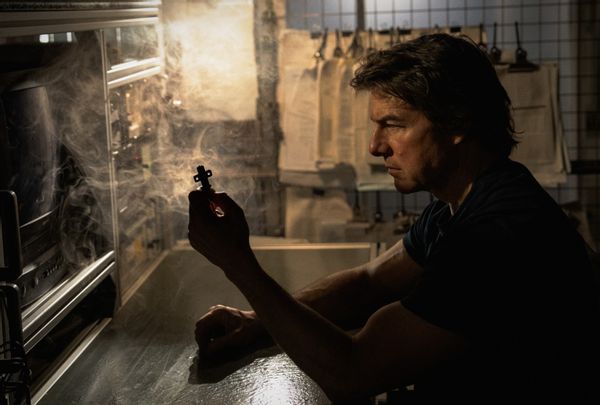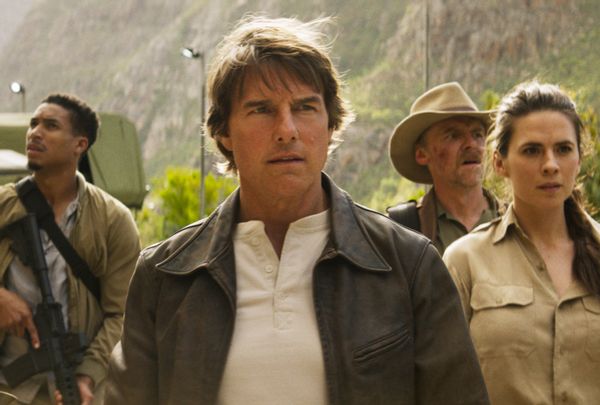
Tom Cruise is a lot of things: movie star, Scientologist, popcorn enthusiast, the worst nightmare of an IKEA living room section. But one thing he’s not, no matter how hard he tries to be, is God. Though you wouldn’t know that by watching “Mission: Impossible - The Final Reckoning,” the latest and potentially last film in the long-running “Mission: Impossible” franchise.
For 35 years, Cruise’s super spy Ethan Hunt and his rotating, crackerjack team of rogue agents have been saving the world from annihilation time and time again, skirting death by a hair each time. Ethan’s ability to thwart his enemies at every turn through sheer will and cunning is bested only by his unyielding compassion. If he cares for someone, he will go to the far reaches of the Earth to save them. Sure, these movies might have plenty of silly, rubber masks and more explosions than you can count. But beyond all the visual shock and awe, it’s Ethan and his cohorts' bleeding-heart humanity that makes the “Mission: Impossible” films so affecting. Even at the end of the world, these characters will sacrifice themselves for — as the Impossible Mission Force slogan says — those they hold close and those they’ll never meet.
Sitting down in a theater and watching “Mission: Impossible - The Final Reckoning,” one can’t help but realize Cruise and Ethan Hunt really aren’t so different. Cruise is an agent all his own, performing the impossible mission of trying to save cinema and unite a people divided. To do it, he’ll risk his life performing death-defying stunts just so their spectacle and authenticity can be part of the draw that gets butts in movie theater seats. We could sit around all day and debate the moral nature of the actor himself, but the fact is, Cruise’s intent is noble. He believes in the power of film and the strength we get from the communal aspect of worshipping at the movie house. He considers cinema to be religion, and the level of entertainment that something like a “Mission: Impossible” movie can provide to be biblical scripture. And in “The Final Reckoning,” Cruise positions Ethan Hunt as a Jesus figure, predestined from birth to save humanity through extreme personal sacrifice, mirroring the actor’s decades-long efforts to join together a broken world in the glow of the silver screen.
Maybe I wouldn’t be so tempted to evangelize if it weren’t for Cruise and director Chris McQuarrie’s ability to so presciently understand what the “Mission: Impossible” franchise can be. Throughout the last four films, this highly dynamic duo has transformed the series from frothy, high-flying, fast-running spy action to frothy, high-flying, fast-running, timely tales of social division. Decent cinematic espionage usually whips a collective cultural anxiety into a sugary sweet, fizzy concoction that sticks to its audience’s nerves like glue. We care so much about our heroes saving the day because they are the ones brave enough to go up against the forces of evil that keep us up at night. If they fail, we all lose. Hope is only as strong as a super spy’s resolve. When that wanes, what’s left for the rest of us?


But this time around, things are different. McQuarrie and co-writer Erik Jendresen have built a world that looks frighteningly similar to our own, where ChatGPT is so prevalent in high schools and colleges that students’ ability to create and think for themselves is rapidly hemorrhaging. Google’s (often incorrect) AI overview is the first thing users see when they search online. People are already happy to let this technology think for them. And yes, the current versions of this AI are dubious, unreliable and artless. But is it so far-fetched to imagine a reality where they’ve become more refined? It’s not just that the tech is changing rapidly; it’s that there are those who want it to change even faster, who gain joy from the mere idea that AI could be such an inextricable part of our lives that anyone with a creative mind is put out of a job. Take a look at the social media replies of any journalist posting about being laid off, and you’ll find that their dejection is like a beacon to the vultures, waiting to pick at the remains of an already desolate media landscape.
In its study of AI, “The Final Reckoning” is unapologetically bleak. McQuarrie and Jendresen have concocted a dour world where normally faceless AI devotees have become public proselytizers. They stand before news cameras, embracing armageddon, preaching about how the Entity will deliver humanity to redemption. In our modern dystopia, fire and brimstone have been replaced by ones and zeroes. Matters have become so dire that the president, Erika Sloane (Angela Bassett), is considering a tactical nuclear strike that will vaporize hundreds of thousands of souls around the world, just to get a jump on the Entity’s growing command of atomic forces. There is no winning unless Ethan and his team can retrieve the Entity’s source code from a submersible at the bottom of the sea and trap it inside a secure server, a mission more impossible than any that have come before it.

Ethan’s noble quest to save humanity reflects Cruise’s genuine belief that humanity is united by the art they can see on the big screen. This decade alone, Cruise excitedly backed the limited, mid-pandemic theatrical release of “Tenet,” extolled the virtues of the theatrical experience in a pre-recorded message playing before “Top Gun: Maverick,” and made a PSA about the evils of motion-smoothing televisions. He’s a guy who wants people to experience the art of filmmaking as it was intended to be seen, every time. He delivers his sermons with such certitude that it’s easy to forget that his actual religious views might be a little precarious (to say the least). And in “The Final Reckoning,” Cruise even has a line about how this fight against AI — and, by extension, Cruise’s fight for the art of cinema through its most mainstream blockbuster form — has become free of ideologies and dogma. What matters is protecting a force like cinema that brings humans together, not emboldening the technology that keeps us apart. Sometimes, you’ve got to hammer that importance into someone — quite literally, in the case of Ethan clobbering a knife-wielding assailant defending the Entity, saying, “You spend too much time on the internet!”

How could you not be filled with the spirit, sitting in front of the big screen, watching what may be the last film of one of cinema’s greatest franchises strip itself of the silliness it has worn like a rubber mask from the beginning to get real with its audience? The espionage terror the “Mission: Impossible” films have cooked up has come to reap. What was once far-fetched is now our reality. Tech will very well be our downfall one day. But under the dark of the theater, we’re afforded the rare chance to remove ourselves from that digital umbilical cord and experience a film as it’s meant to be seen, alongside people who want to do the same. Call it movie magic. Call it religion. Just don’t call it the end.







